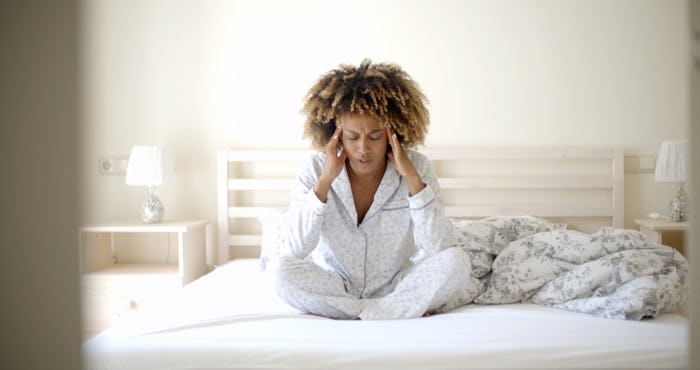Life
Here's How Awareness Of Postpartum Depression Has Evolved Over The Years
The symptoms of postpartum depression (PPD) include fearing that you are a bad parent and thinking about harming your child, so it's no wonder that discussing the relatively common illness has historically been taboo. After all, Americans tend to have a hard time talking about mental illnesses and recognizing that they are ailments that need treatment just like a broken arm and diabetes do. But, thanks to an emerging national conversation about PPD, the situation is improving for new moms and dads. Here's how awareness for postpartum depression has evolved over the years — even if the pervasive overwhelming (and undeserved!) stigma is far from having scuttled back to the deep dark hole where it belongs.
Back in 2011, NPR reported that it is exactly this stigma that oftentimes prohibits moms with PPD from accessing the care they need. Seattle mom Heidi Koss — who tried to kill herself as a result of her PPD — told the outlet that she felt as though "admitting that I was struggling meant I was a bad mother." And Koss is far from alone in feeling this way, even though the advocacy group Postpartum Progress estimates that as many as 15 percent of new moms suffer from PPD. And the struggle to get help (Koss's obstetrician initially told her he couldn't help her) isn't a huge surprise: In 2011, University of Pittsburgh psychiatry professor Katherine Wisner told NPR that many medical professionals weren't trained to deal with it.
But things appear to be looking up, at least in terms of some recent initiatives to bring people dealing with PPD out of the shadows and the willingness of some prominent figures to talk about their own experiences.
For example, Postpartum Support International declared May National Maternal Mental Health Awareness Month back in 2011. According to a press release, the goal of dedicating a whole month to PPD was to encourage moms to start talking about their struggles, rather than working so hard to conceal them — and, ultimately, get the treatment they need.
And in an even more concrete and potentially beneficial move, the U.S. Preventive Services Task force issued new recommendations in early 2016 that all pregnant and postpartum women be screened for depression. As Babble noted, this is crucial because screening for depression before a woman gives birth could help to make certain that she will have the resources to properly address any problems that may arise as early as possible. This is great news, because it stands to reason that if medical care providers are actively talking to moms and soon-to-be moms about this issue, the better-equipped they'll be to deal with it. Hopefully, this would also translate to a shedding of stigma as people realize that PPD is a real medical challenge, not some glaring character flaw.
But perhaps the most important and effective factor propelling the conversation about PPD forward is when real people share their experiences. As former PPD sufferer Koss pointed out to NPR, just hearing about celebrities such as Brooke Shields talk about going through postpartum depression helped her to feel as though the stigma was, to some extent, starting to melt away.
In fact, Shields wrote an entire memoir on the subject, Down Came the Rain: My Journey Through Postpartum Depression, which was published in 2005. Since then, a not-insignificant cadre of prominent women have followed in the actress's path of openness. Just this week, for example, first daughter and senior adviser to the president Ivanka Trump revealed to Dr. Oz that she had dealt with PPD after the births of each of her three kids. "I felt like I was not living up to my potential as a parent or as an entrepreneur and executive," she said, according to The Washington Post. And in an interview with People magazine earlier this month, singer Alanis Morissette described her own PPD as "very isolating."
The world is learning the stories of moms without star power, too. Kathy DiVincenzo, for instance, who shared a photo (which she described as "uncomfortable") of what PPD looks like in her life in order to #EndTheSilence. And after Kara Kovlakas took her own life as the result of PPD, her five sisters decided to launch the maternal mental health advocacy website Light For Kara.
Finally, researchers are learning that dads can and do suffer from PPD, too, helping to end the specific stigma related to their dealing with an issue traditionally associated with women. By being up front about his struggles, star of the TLC reality series OutDaughtered Adam Busby is making great strides for other dads on that front.
The conversation is evolving and moving forward. Let's make sure it doesn't lose its momentum.
